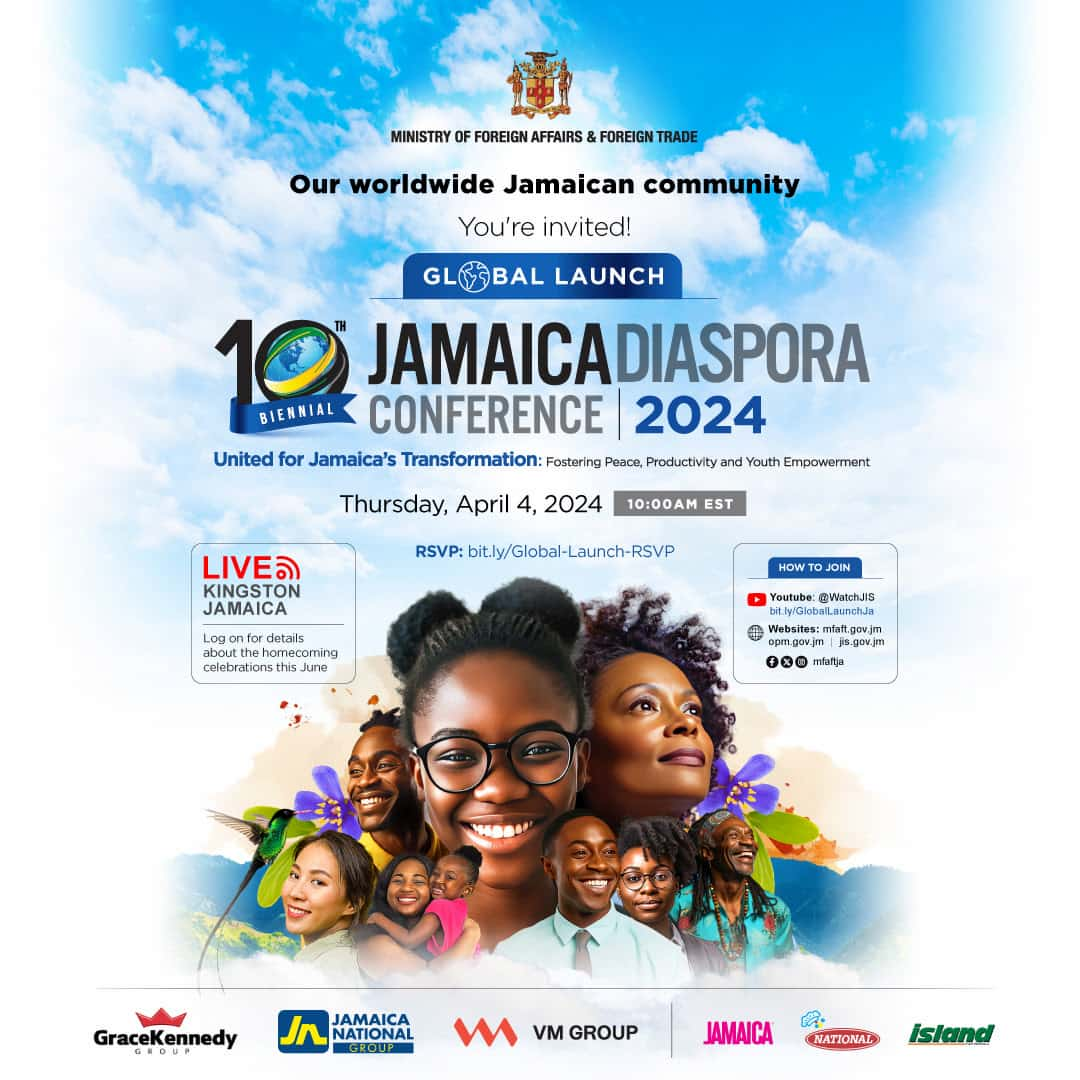By Leo Gilling
At this time, every two years, tension rises among members of the Diaspora who are actively involved in Diaspora engagements and planning to attend the Biennial Conference. It’s been twenty years since the first Biennial Conference in downtown Kingston. Many original players in what we regard as the Diaspora Movement are either retired, home to their maker or lost interest for one reason or another. Only a few are left to teach, mobilize, motivate, and keep alive the problematic task of advancing the original plans of the Diaspora Movement. However, some will say that mentorship opportunities no longer exist.
As plans get into gear for the biennial event, several factions or individuals want to ensure they are in the thick of things. Some want to elevate their public presence and image, while others jockey for positions at the conference. For most people living in the various parts of the Diaspora, the Biennial Diaspora Conference means nothing.
When the elders created the Diaspora Movement’s plan in 2003, they intended to create avenues to mobilize and motivate Diaspora action to improve the relationship with Jamaica and to help their home country. Out of that meeting, several institutions were born: the Jamaica Diaspora Institute (JDI), the Jamaica Diaspora Foundation (JDF), and the Biennial Diaspora Conference, all meant for a two-way engagement between Jamaica and the Diaspora. There has not been any mention of the JDI and the JDF anywhere in the past seven years. They were significant planks in the development of the Movement during the early days.
The Movement also involved appointing key individuals in the significant Diaspora regions abroad where Jamaicans live and work. The elections were held in Jamaica at the conferences until 2012, then moved to the areas in the Diaspora. After the elections, and based on the results, the Minister of Foreign Affairs and Foreign Trade (MFAFT) appointed seven persons to form a Diaspora Advisory Board (DAB) to advise the Minister. There were three in the USA, two in Canada, and two in the UK. One of the early primary roles of the seven was to build the Movement, starting with creating awareness in their regions about this new approach to Diaspora engagement. The Board advised the government of Jamaica.
For the next twelve years, the Advisory board would meet with the Minister twice yearly to report the happenings in their regions, discuss the mobilization efforts, and respond to recommendations from the previous conferences. Mobilization was difficult as the Movement was new, and only a few people abroad or in Jamaica knew what “Diaspora” meant. The idea was laughable to many. Jamaicans at home associated the term Diaspora with “shop talk,” a phrase not welcomed by active members of the Diaspora at the time. Political leaders, not in tune with the Movement, criticized the expenses for the Biennial Conference as money wasted.
Each board member of the DAB operated within the confines of a Terms of Reference (TOR) that guided how they should operate as an agent of the Jamaican government. The TOR was loosely written, giving board members ease of Movement to seek opportunities to build and collaborate. It was, however, evident, for example, that board members must execute their roles as individual advisors rather than as an organization representing the government of Jamaica. They were not allowed to form an organization around their appointment. The DAB Board was the only group created to serve as the advisor.
With such a rich history, one could understand that when the Global Jamaica Diaspora Council (GJDC) and its youth arm were formed to replace the DAB, it shocked the individuals actively advancing the Movement since its inception. Some of these leaders complained of being sidelined upon introducing the new Councils. They argued that, in the past, former and current board members worked to gather to build even through the heavy challenges. GJDC replaced the Jamaica Diaspora Advisory Board (DAB) effective January 2020.
Many original leaders in the Diaspora Movement do not believe that the new council has strengthened the mechanisms responsible for enhancing Diaspora engagement but has weakened the structure globally. They think it’s counterproductive, as only a few people know who these members/agents are and where they are. Now that the members of the Diaspora know that after they have voted to elect members/agents, they are not serving as representatives of the community but acting as agents of the government of Jamaica. Such confusion causes many questions and uncertainties about the relationship between the government of Jamaica and its Diaspora.
Further, the election designed and executed by the MFAFT is a significant cause of confusion and uncertainties. For example, a foreign government conducting elections on American soil is questionable. Encouraging Jamaicans abroad to cast ballots to elect regional political agents is doubtful. Further, while most voters think they are voting for their community representative, they soon find out it is not. They are voting, in fact, for the candidate who will be appointed as a government representative.
Additionally, voting on the MFAFT’s website feels wrong for one government to conduct political elections on another country’s soil. I am not a lawyer, a judge, or a congressman, and I do not work in the Department of Justice. However, whether we want to admit it or not, this GJDC is a political element from another country. The political policies of one country have crept and reached another country. Such activity might be looked at as “walking a fine line.” The new Jamaica Diaspora policy, which encompasses the GJDC members’ roles, makes this a political operation. Further, according to the Ministry of Foreign Affairs and Foreign Trade’s website, the Minister currently sits as the chair of the GJDC. Jamaica should be concerned about how the GJDC operates, especially in the USA, which has laws to monitor persons appointed by foreign governments.
I intentionally referred to the council members of the GJDC as agents. They are, truthfully, foreign agent, a fact confirmed by the USA’s FARA Act of 1938. That is not a bad thing, however. They are Jamaicans representing Jamaica in their Diaspora region. We should, however, call a spade a spade. Since the GJDC council members in the USA operate in their home country and under the direction of the Government of Jamaica, they are “foreign agents.” The Act states that Foreign agents (FA)s are defined as individuals or entities engaged in domestic lobbying or advocacy for foreign governments, organizations, or persons (“foreign principals”). They act as a foreign principal’s public relations counsel, publicity agent, information-service employee, or political consultant; solicit, collect, disburse, or dispense contributions, loans, money, or other things of value for or in the interest of a foreign principal. All FAs must register with the Department of Justice (DOJ) and disclose their relationships and activities. As of the conclusion of this article, the only organization in Jamaica that is an active registered foreign agent on the DOJ’s site is the Jamaica Tourist Board (JTB), which was registered as a foreign agent in 1972.
Based on the FARA information, I now understand why some people are voicing their concerns about the legitimacy of the GJDC in the USA. An FA operating in the United States has responsibilities and should consult the Department of Justice in the United States for more information. Australia also has a foreign agent policy. However, Canada and the United Kingdom have only announced plans to introduce a similar regime.
Suppose you live in the USA and do not take directions from foreign governments. You are not appointed by or signed agreements to perform duties directly or indirectly from external political authorities? In that case, you are not considered a foreign agent. You have no such responsibilities to the DOJ. Notwithstanding the information on the FARA Act, we need agents to help the Diaspora Movement succeed. However, it should be appropriately structured so that the official process does not hinder Diaspora relations and interrupt the natural flow of activities. Our island’s government should know and work closely with experienced Diaspora leaders to make it right. It is essential to keep in touch with the Diaspora, understand the lay of the land, and forge partnerships to help build our country.
As advisors and foreign agents, the GJDC can lend leadership through observation, guidance, and providing updates to the Government of Jamaica on what is happening in the various communities so that political leaders can better respond to the needs of the Diaspora community and open opportunities for partnership and collaboration. If the agents live in the USA, they must also abide by the rules of the FARA Act. Like the Jamaica Tourist Board (a registered agent since 1972), the MFAFT should consider registering the GJDC with the US DOJ under the FARA Act. With that, the MFAFT doesn’t need to register a business interest in any state. Such registration is federally acknowledged for all 50 states.
To reduce some of the tensions and uncertainties around the GDJC, the MFAFT should first refrain from and remove from their portfolio the role of conducting Diaspora elections across jurisdictions. That role does not belong to the Government of Jamaica. The Diaspora should conduct its elections if they decide it’s necessary. The Diaspora is complete with competent individuals capable of designing policies around elections and executing them accordingly. The Government of Jamaica has other ways of appointing council members. No election is needed. Locally, Jamaica has no election requirements for individuals to be appointed to serve on government boards and agencies. However, a global election is required for the GJDC, an entirely voluntary post, to serve from abroad. The government should remove the need for this confusing election activity and appoint people from the Diaspora who they feel can serve in roles on the GJDC and the Diaspora Policy. The Diaspora will determine the mechanisms they want to utilize for diaspora engagement.
On the 10th Biennial Jamaica Diaspora Conference, to be held at the conference center in Montego Bay, I fully support this instrument of Diaspora engagement. It is where I have gained much of my insights, network, and understanding of Diaspora movements. The conference is the Jamaican government’s way of showing us how important we are to the country’s advancement and encouraging partnership and collaboration. You should do so soon if you still need to register to attend the three-day event. On the fourth day, June 20th (Diaspora Day of Service), the conference attendees go into the community to tackle planned development activities. They can work collectively on community projects and bond with others for the betterment of Jamaica.
Many opportunities exist for a two-way partnership between the Diaspora and Jamaica. Jamaica partners with the Diaspora and the Diaspora partners with Jamaica for development. Nuttin nuh sweeta!
Leo Gilling serves as the Diaspora Strategist & Engagement Advocate and Chairman of the Jamaica Diaspora Taskforce Action Network (JDTAN)




